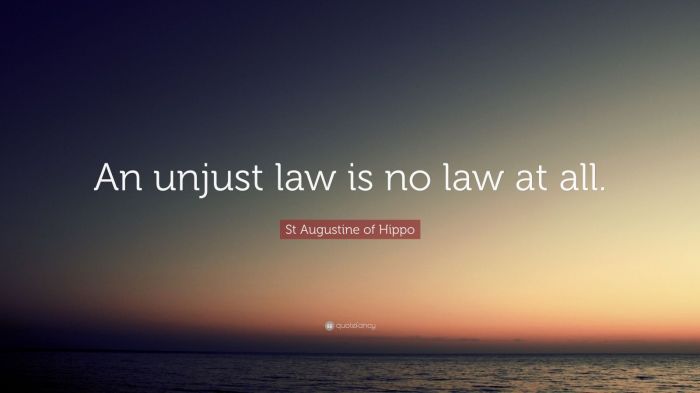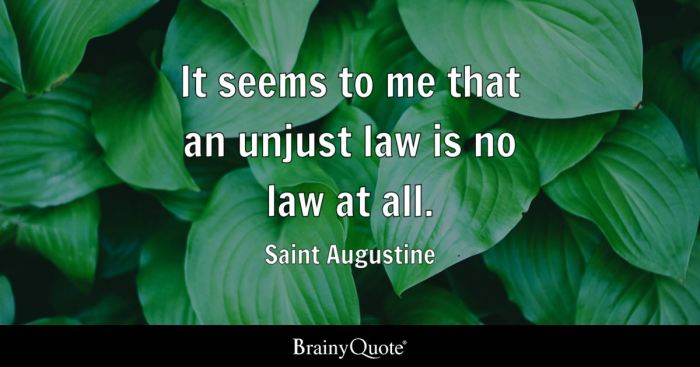An unjust law is no law at all st augustine – As the profound words of St. Augustine, “An unjust law is no law at all,” reverberate through the annals of history, they ignite a profound discourse on the intricate relationship between law, morality, and justice. This exploration delves into the multifaceted implications of unjust laws, examining their legal, ethical, and societal ramifications.
Unveiling the ethical dilemmas inherent in enforcing unjust laws, this discourse explores the complexities of civil disobedience and resistance. By examining historical and contemporary examples, it sheds light on the moral and legal considerations that shape individuals’ responses to unjust laws.
Legal and Ethical Implications
An unjust law is one that violates fundamental principles of justice and fairness. It may infringe upon individual rights, undermine the rule of law, or perpetuate social inequality. The legal implications of enforcing unjust laws can be severe, as they may result in:
- Unlawful arrests, convictions, and punishments
- Erosion of trust in the justice system
- Legitimization of oppressive or discriminatory practices
Enforcing unjust laws also poses ethical dilemmas for law enforcement officers, judges, and other legal professionals. They may face conflicts between their duty to uphold the law and their moral obligation to do what is right. This can lead to:
- Selective enforcement or non-enforcement of unjust laws
- Civil disobedience or resistance to unjust laws
- Resignation or termination of employment
The Role of Morality in Law

The relationship between morality and law is complex and multifaceted. Laws are often based on moral principles, such as justice, equality, and fairness. However, not all laws are inherently moral, and some may even violate basic moral principles. The extent to which laws should reflect societal values is a matter of ongoing debate.
Some argue that laws should be based solely on objective principles of justice, regardless of popular opinion. Others believe that laws should reflect the values and beliefs of the society they govern. The separation of morality from law can lead to:
- Laws that are not supported by public opinion
- Laws that are difficult to enforce
- Laws that undermine the legitimacy of the legal system
Civil Disobedience and Resistance
Civil disobedience is the nonviolent refusal to comply with unjust laws. It is often used as a form of protest or to bring attention to a particular issue. Civil disobedience can take many forms, such as:
- Boycotts
- Sit-ins
- Non-violent demonstrations
Engaging in civil disobedience can have ethical and legal consequences. Ethical considerations include the potential for harm to oneself or others, as well as the impact on the cause one is supporting. Legal consequences can include arrest, fines, or imprisonment.
The Nature of Justice

Justice is a complex concept with multiple interpretations. It can refer to fairness, equality, or the upholding of rights. In the context of unjust laws, justice is violated when the law itself is unfair or when it is applied in an unfair or discriminatory manner.
An unjust law undermines the principles of justice by:
- Violating individual rights
- Perpetuating social inequality
- Undermining the rule of law
The Impact on Society

Unjust laws can have a profound impact on society. They can:
- Erode trust in government and institutions
- Create division and conflict within society
- Lead to social unrest and violence
Unjust laws can also have negative economic consequences, such as:
- Reduced economic growth
- Increased unemployment
- Reduced investment
Historical and Cultural Perspectives: An Unjust Law Is No Law At All St Augustine
The concept of unjust laws has been recognized throughout history and across cultures. In ancient Greece, Socrates argued that an unjust law is not a law at all. In the United States, the Declaration of Independence states that governments derive their just powers from the consent of the governed.
The treatment of unjust laws varies across societies. In some cultures, unjust laws may be openly challenged and resisted. In other cultures, unjust laws may be tolerated or even accepted as legitimate.
FAQ
What is the significance of St. Augustine’s quote, “An unjust law is no law at all”?
St. Augustine’s quote encapsulates the idea that laws lacking moral legitimacy cannot be considered true laws. It underscores the fundamental connection between law and justice, emphasizing that laws must align with ethical principles to be considered valid.
How does the concept of civil disobedience relate to unjust laws?
Civil disobedience refers to the nonviolent refusal to comply with unjust laws. It is a form of protest that aims to highlight the moral bankruptcy of such laws and pressure authorities to repeal or amend them.
What are the potential consequences of enforcing unjust laws?
Enforcing unjust laws can lead to a range of negative consequences, including erosion of trust in government, social unrest, and the suppression of fundamental rights and freedoms.